Watch video lectures of the course HPC Fundamentals for end-users
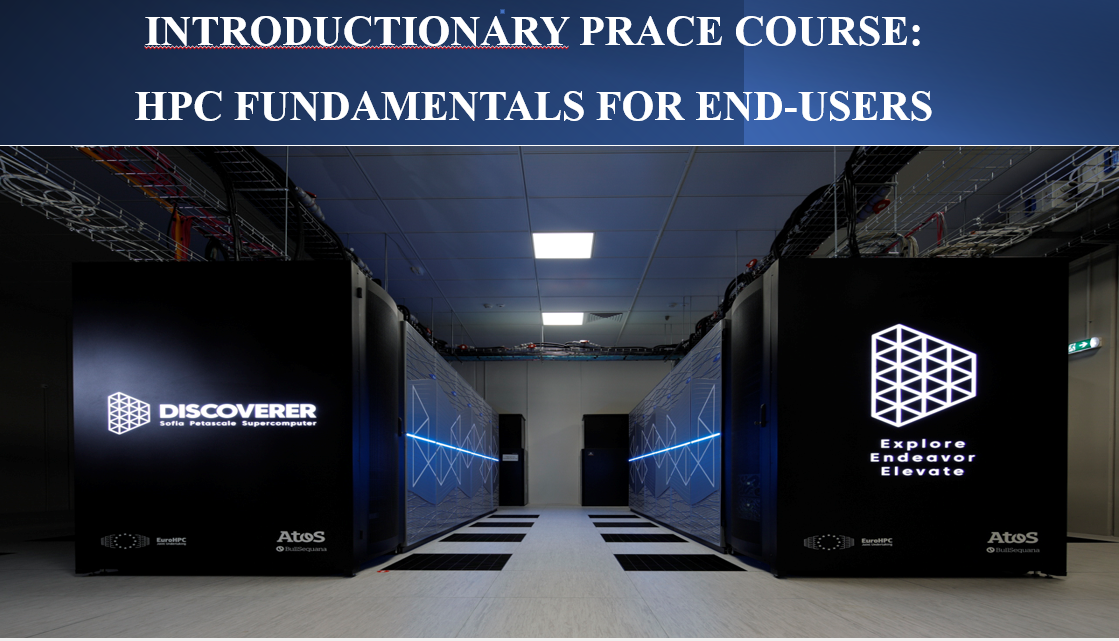
HPC Fundamentals for end-users was one of the most successful courses and that is why we upload all video lectures here, here and here. And the presentations, also. You can find them here.
The course was an introductory on how to use Discoverer supercomputer - a EuroHPC petascale system capable of executing more than 4,2 Petaflops Rmax and over 6 petaFLOPS Rpeak, by users with no prior exposure to supercomputing systems. This course was for beginner and intermediate HPC users that will allow them to master their skills, knowledge and confidence to work with supercomputing environments. The course introduced the Discoverer systems and computing architecture, including storage subsystem and computer network infrastructure. Practical sessions covered examples from different research fields such as Life Sciences, Material Science and Multiphysics simulations.
This course was a joint effort by NCSA Bulgaria and PetaSC/Sofia TechPark, Center of Excellence in Combustion (CoEC), BioExcel Centre of Excellence, STFC Daresbury Laboratory.
The objective of this first course of the series is to provide essential knowledge in modern petascale architectures and computing environments as well as the necessary fundamental skills and knowledge on how to harness the capacity and capability of supercomputing systems up to the petascale level.
More specific goals were:
- Understanding of modern HPC architectures with a focus on Discoverer system;
- Navigating through a typical HPC environment on Discoverer (terminal access and file transfer tools, usage of the module system);
- Submitting jobs by utilizing batch queuing and scheduling system SLURM;
- Working with compilers and building tools available on Discoverer;
- Compiling and running parallel codes on GROMACS, CP2K, Alya, NAMD, DL_PLOY and DL_MESO.
South-East Europe Combustion Spring School 2022
March 22-23, 2022
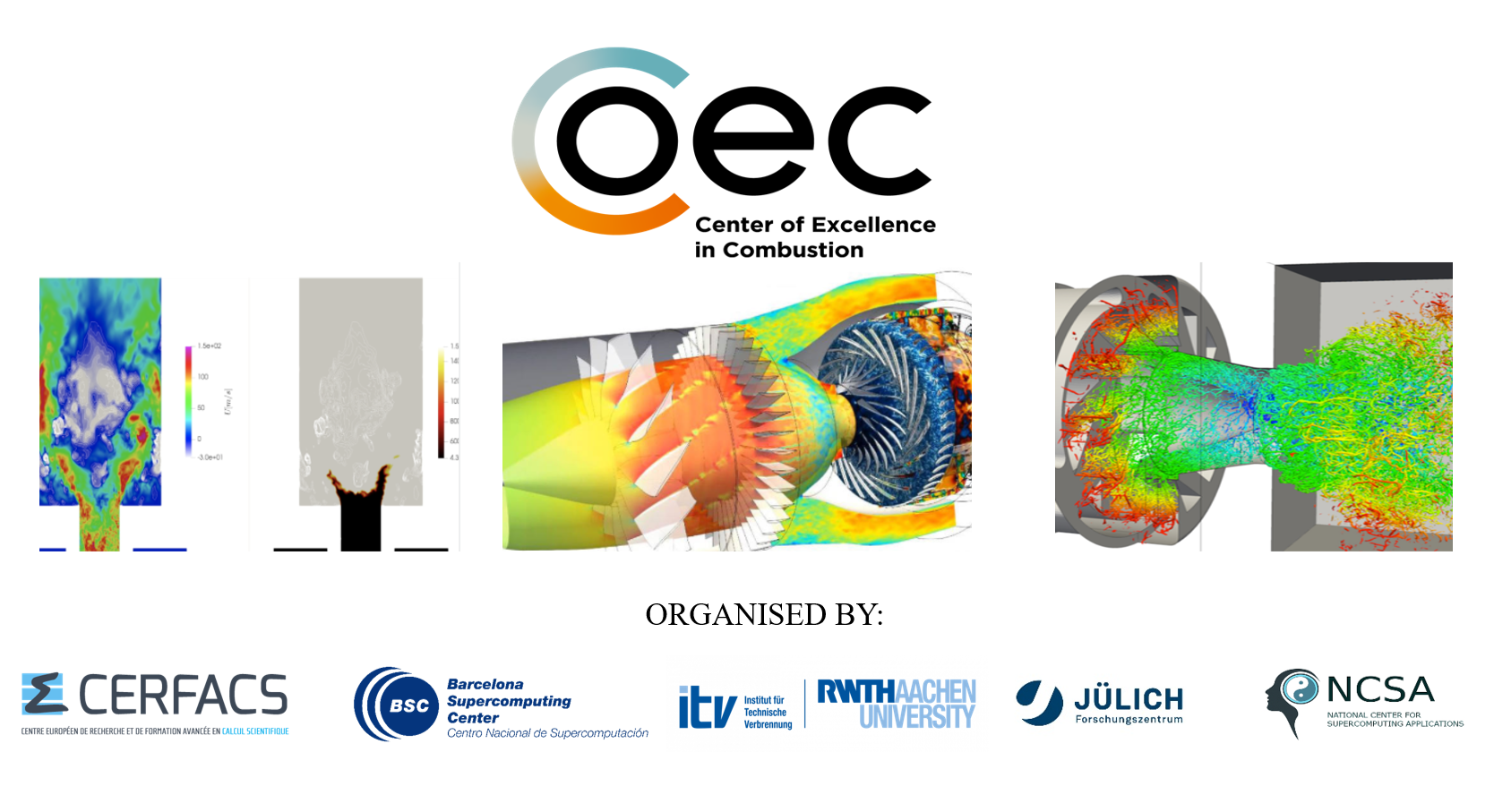
Venue: Online via Zoom
Description: South-East Europe Combustion Spring School 2022 intends to give a high view of fundamental aspects and current challenges in combustion, as well as to introduce the use of Machine Learning (ML) and High Performance Computing (HPC) to approach Exa-scale simulations of turbulent reacting flows. In this course, different methodologies to enhance the computational performance of high-fidelity combustion simulations will be introduced. The methods cover from node to system-level performance optimisations and algorithms for combustion simulations. This is the first training course in a series of two CoEC seasonal schools that will take place in 2022. This introductory school to combustion will allow participants to acquire new knowledge and strengthen their understanding in a range of topics including laminar flames, turbulent combustion, ML and HPC methodologies in combustion and interactive supercomputing for in-situ analysis. In the following up CoEC School for 2022, we will build on the ground of the first school by extending the scope and topics covered and by including a number of hands-on exercises.
The CoEC Spring School 2022 is a joint effort by NCSA Bulgaria, CERFACS (France), BSC (Spain), Institute of Combustion Technology (ITV) - RWTH Aachen University (Germany) and Juelich Supercomputing Centre (Germany).
What you will learn
- Basics of laminar combustion including equations, combustion chemistry, flame regimes and structures;
- Understanding of phenomenology of turbulence and turbulent combustion;
- Presentation of turbulent combustion models for the simulation of combustion chambers;
- Introduction to Center of Excellence in Combustion (CoEC): Applying exascale computing technologies to promote and develop advanced simulation software;
- Introduction to ML algorithms and to combustion models that will benefit from ML;
- Presentation of modeling of chemical mechanisms through artificial neural network;
- Presentation of modeling turbulence and scalar fluxes in numerical simulations through a convolutional neural network and super-resolution generative adversarial network.
Target audience: Under-graduate and graduate students, Ph.D. students, junior researchers (academy and industry) with some knowledge in Computational Fluid Dynamics (CFD).
Selection process: There is a threshold number of participants (no more than 90 registrations), a timely registration is essential. We will stick to the following criteria:
- 80% for attendees from institutions (universities, research centers, and companies) based in the EU or Associated Countries to the Horizon 2020 Programme and 20% for others.
- If the threshold is exceeded, we will prioritise attendees from South-East Europe, Israel, and Ukraine as well as participants that come from EU13 countries.
Programme: Please click here
Cost: There is no registration fee. The CoEC School is free of charge.
Registration: Please click here
Registration deadline: March 16, 2022.
For any further information, please feel free to contact us @ g.prangov@ncsa.bg
Below you can see the latest schools and training of NCSA.
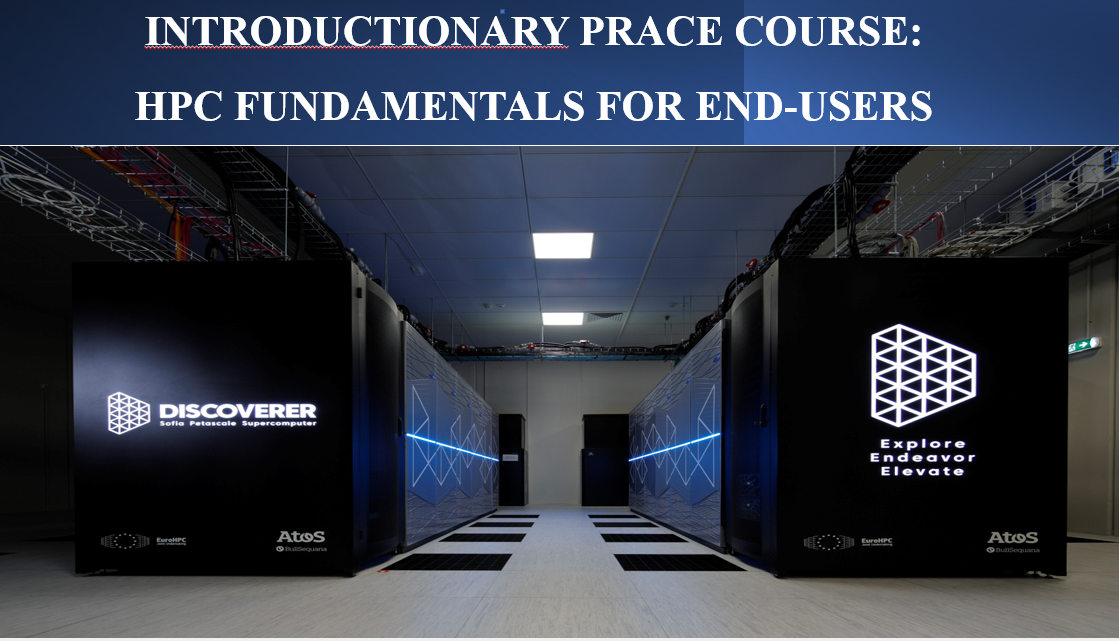
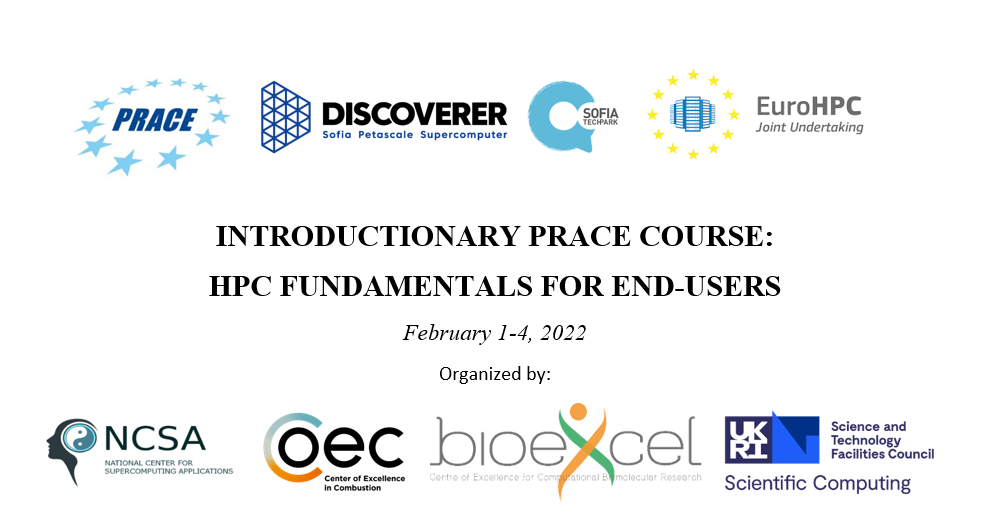
Venue: Online via Zoom
Description: HPC Fundamentals for end-users is an introductory course on how to use Discoverer supercomputer, a EuroHPC petascale system capable of executing more than 4,2 Petaflops Rmax and over 6 petaFLOPS Rpeak, by users with no prior exposure to supercomputing systems. This is the first training course in a series of two courses for beginner and intermediate HPC users that will allow them to master their skills, knowledge and confidence to work with supercomputing environments. The course will start with an introduction to the Discoverer systems and computing architecture including storage subsystem and computer network infrastructure. During the four days training, there would be a number of hands-on exercises so that attendees will gain immediate experience on working in a typical user environment by building and running state of the art parallel codes on the Discoverer system. Practical sessions will cover examples from different research fields such as Life Sciences, Material Science and Multiphysics simulations. Sofia TechPark will graciously provide Discoverer compute resources for the hands-on sessions. The series of two courses is a joint effort by NCSA Bulgaria and PetaSC/Sofia TechPark, Center of Excellence in Combustion (CoEC), BioExcel Centre of Excellence, STFC Daresbury Laboratory.
Here is the invitation letter from Prof. Stoyan Markov, Chairman of NCSA.
Here you can see the invitation letter in Bulgarian.
Registration: closed
Objective: The objective of the first course is to provide attendees with essential knowledge in modern petascale architectures and computing environments as well as the necessary fundamental skills and knowledge on how to harness the capacity and capability of supercomputing systems up to the petascale level.
What you will learn
- Understanding of modern HPC architectures with a focus on Discoverer system
- Navigating through typical HPC environment on Discoverer (terminal access and file transfer tools, usage of the module system)
- Submitting jobs by utilizing batch queuing and scheduling system SLURM
- Working with compilers and build tools available on Discoverer
- Compiling and running parallel codes on GROMACS, CP2K, Alya, NAMD, DL_PLOY and DL_MESO
Target audience: Under-graduate and graduate students, PhD students, junior researchers (academy and industry), IT specialists, Software Engineers or anyone who wants to use Discoverer petascale supercomputer system in their research & business.
Prerequisites: No prior knowledge and experience with computational methodologies and HPC is required. Attendees should have basic computer management skills and be able to work comfortably on the Unix/Linux command line, notion of compilers and build procedures. For those who would like to brush up on their Linux knowledge, we are going to organize a dedicated course “Practical Introduction to Linux” in January 13-14, 2022. The latter course is open only for registered attendees in the “HPC Fundamentals for end-users” course. They can express interest in the refresh course by registering here.
Selection process: There is a threshold number of participants (no more than 40 registrations), timely registration is essential. Attendees must be from institutions (universities, research centers, and companies) based in the EU or Associated Countries to the Horizon 2020 Programme. We will prioritise attendees from South-East Europe, Israel and Ukraine as well as participants that come from other EU13 countries.
Programme: A detailed programme will be announced in early January 2022 on the course webpage. A shortlist of the software packages for hands-on sessions includes GROMACS, CP2K, Alya, NAMD, DL_PLOY and DL_MESO.
Cost: There is no registration fee. The course is free of charge.
Registration deadline: January 25, 2022.
Organising committee leaders: Assoc. prof. Dr. Peicho Petkov (NCSA) and Prof. Dr. Simeon Stoyanov (PetaSC).
Contact: g.prangov@ncsa.bg
Below you can see the latest schools and training of NCSA.
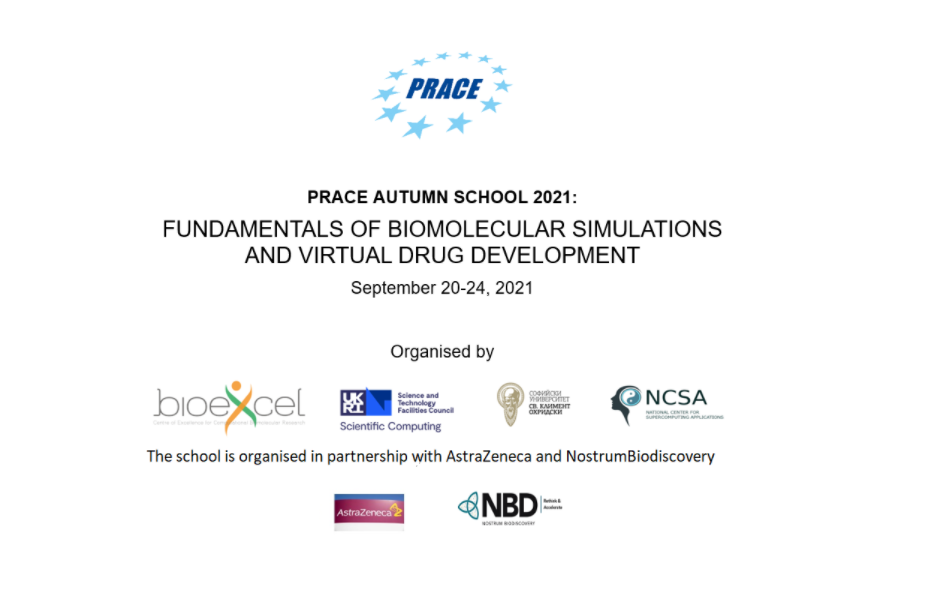
The school will provide an introduction to the fundamentals of modern approaches employed for modelling and prediction of the behaviour of bioactive systems and functional materials – molecular dynamics (MD), 3D Quantitative structure-activity relationship (3D QSAR), and QM/MM (Quantum mechanics/Molecular mechanics). We will focus on docking and MD-based free energy calculations and applying Quantum mechanics/Molecular mechanics (QM/MM) methods to study enzymatic reactions.
The capacity of HPC facilities for performing such simulations will be outlined with an emphasis on commonly applied parallelisation techniques in computational science. All lectures and computational methods will be presented in a way accessible to applied scientists who are not specialists in those fields but would like to broaden their research scope. Lectures will be supplemented by demonstrations using GROMACS, HADDOCK and ChemShell - widely used software packages for HPC modelling and simulations. The target audience is junior researchers (post-graduates and post-docs) with a background in natural sciences and in particular, pharmacy, biochemistry and biophysics, working at European academic research institutions and industry.
Trainees from Central and Eastern Europe are especially welcome. Participation is free.
The school is a joint initiative of PRACE, the BioExcel Centre of Excellence, STFC Daresbury Laboratory, NCSA Bulgaria, and Sofia University.
The activities will be carried out online using Zoom.
You can learn more from these two videos. The first video is an intellectual property of NVIDIA. The second is created by BioExcel.
Here you can find an introduction to our school - the Swiss protocol for in silico drug design applied as a closed procedure for searching for drugs against COVID -19, which is used by Novartis and Hoffmann La Roche. This two-hour lecture is organised by the Swiss Institute of Bioinformatics.
Registration
Please visit PRACE website and fill out the registration form
Programme
10:00 Opening the Zoom meeting
Day 1, September 20:
HPC for applied research
All indicated times are in the Central European Summer Time (CEST) zone (GMT +2)
09:50 - 10:00
Opening
Prof. Anela Ivanova,
Faculty of Chemistry and Pharmacy, Sofia University, Bulgaria
Moderator: Prof. Anela Ivanova,
Faculty of Chemistry and Pharmacy, Sofia University, Bulgaria
10:00 - 10:50
Lecture: Drug Design: Past, Present and Future
Prof. Irini Doychinova, Faculty of Pharmacy, Medical University, Sofia, Bulgaria
10:50 – 11:00
Lecture: BioExcel Centre of Excellence – Advanced applications and
services for computational biomolecular research
Dr. Rossen Apostolov, KTH Royal Institute of Technology, Sweden
11:00 – 11:30
Break
11:30 -12:30
Lecture: Parallelisation paradigms: Introduction to methodologies
for parallelisation, application of MPI and OpenMP
Dr. Valentin Pavlov, Rila Solutions, Bulgaria
12:30 - 14:00
Lunch break
Moderator: Prof. Nevena Ilieva, Institute of Information and Communication Technologies, Bulgarian Academy of Sciences
14:00 - 15:30
Training (demonstration)
Prof. Emanouil Atanassov,
The Institute of Information and Communication
Technologies at the Bulgarian Academy of Sciences
15:30 - 16:00
Break
16:00 - 16:30
Discoverer EuroHPC supercomputer
Prof. Ivan Dimov, Member of EuroHPC Governing Board
Day 2, September 21:
Biomolecular simulations with Molecular Dynamics
All indicated times are in the Central European Summer Time (CEST) zone (GMT +2)
Moderator: Dr. Michael Seaton, STFC Daresbury Laboratory, UK
09:30 - 10:30
Lecture: Basics of Molecular Dynamics
Prof. Anela Ivanova,
Faculty of Chemistry and Pharmacy, Sofia University, Bulgaria
10:30 – 11:00
Break
11:00 – 12:00
Lecture: Introduction to Molecular Dynamics simulations with GROMACS
Asoc. Prof. Peicho Petkov,
Faculty of Physics, Sofia University, Bulgaria
12:00 - 13:30
Lunch break
Moderator: Dr. Michael Seaton, STFC Daresbury Laboratory, UK
13:30 - 15:00
Practical session: Demonstrations on how to prepare and run an MD
simulation with GROMACS on a supercomputer
Asoc. Prof. Peicho Petkov,
Faculty of Physics, Sofia University, Bulgaria,
Stoyan Iliev, Faculty of Chemistry and Pharmacy, Sofia University
15:00 - 15:30
Break
15:30 - 16:30
Best practices and Q&A session on HPC usage of GROMACS for biomolecular simulations
Prof. Berk Hess,
KTH Royal Institute of Technology, Sweden
Day 3, September 22:
Integrative modelling, Docking and Free energy calculations of biomolecular systems
All indicated times are in the Central European Summer Time (CEST) zone (GMT +2)
Moderator: Dr. Rossen Apostlov, KTH Royal Institute of Technology, Sweden
09:30 - 10:30
Lecture: Introduction to free energy calculations with PMX
Dr. Vytautas Gapsys,
Max Planck Institute for Biophysical Chemistry, Germany
10:30 - 11:00
Break
11:00 - 12:00
Practical session: Demonstrations and hands-on session for working with PMX
Dr. Vytautas Gapsys,
Max Planck Institute for Biophysical Chemistry, Germany
12:00 - 12:30
Lecture: Application of molecular dynamics simulations in the
field of drug discovery
Dr. Christian Margreitter, AstraZeneca, UK-Sweden
12:30 -14:00
Lunch break
14:00 - 15:00
Lecture: Basics of docking for drug design
Prof. Alexandre Bonvin, Utrecht University, Netherlands
&
Lecture: Introduction to HADDOCK
Prof. Alexandre Bonvin, Utrecht University, Netherlands
15:00 - 15:30
Break
15:30 - 16:30
Practical session: Demonstrations and hands-on session for working with HADDOCK
Prof. Alexandre Bonvin, Utrecht University, Netherlands
Day 4, September 23:
DL_Software and Hybrid-QM/MM approaches in biomolecular sciences via ChemShell
All indicated times are in the Central European Summer Time (CEST) zone (GMT +2)
Moderator: Dr. Kakali Sen, STFC Daresbury Laboratory, UK
09:30 - 10:00
Lecture: Introduction to Daresbury Laboratory Molecular Modelling Suite
Prof. Ilian Todorov, STFC Daresbury Laboratory, UK
10:00 - 10:45
Lecture: Introduction to ChemShell
Dr. Tom Keal, STFC Daresbury Laboratory, UK
10:45 - 11:15
Break
11:15 - 12:00
Demonstration 1: First steps with ChemShell
Dr. Tom Keal, STFC Daresbury Laboratory, Dr. You Lu, STFC Daresbury Laboratory, Dr. Kakali Sen, STFC Daresbury Laboratory
12:00 - 13:30
Lunch break
Moderator: Dr. Tom Keal, STFC Daresbury Laboratory, UK
13:30 - 14:15
Lecture: Biomolecular modelling with QM/MM
Dr. Kakali Sen, STFC Daresbury Laboratory, UK
14:15 - 14:30
Lecture: The Py-ChemShell biomolecular workflow
Dr. You Lu, STFC Daresbury Laboratory, UK
14:30 - 15:00
Break
15:00 – 16:30
Demonstration 2: Biomolecular modelling with ChemShell
Dr. Tom Keal, STFC Daresbury Laboratory, Dr. You Lu, STFC Daresbury Laboratory, Dr. Kakali Sen, STFC Daresbury Laboratory
Day 5, September 24:
Success stories and showcases of using HPC for biomolecular
and applied research in Central and Eastern Europe
All indicated times are in the Central European Summer Time (CEST) zone (GMT +2)
Moderator: Dr. Elena Lilkova, Institute of Information and Communication Technologies, Bulgarian Academy of Sciences
09:30 - 10:00
Lecture: Different approaches for finding ligands inhibiting the NSP10/NSP16 complex of the SARS-CoV-2
Asoc. Prof. Miroslav Rangelov, Institutes of Organic Chemistry with Centre of Phytochemistry, Bulgarian Academy of Sciences, Dr. Nadezhda Todorova,
Institute of Biodiversity and Ecosystem Research,
Bulgarian Academy of Sciences, Prof. Stoyan Markov, National Center for Supercomputing Applications, Prof. Dr. José Antonio Encinar, Instituto de Investigación, Desarrollo e Innovación en Biotecnología Sanitaria de Elche (IDIBE)
10:00 - 10:30
Lecture: In silico study of the anti-inflammatory action of heparin within the Covid-19 context
Prof. Nevena Ilieva, Institute of Information and Communication Technologies, Bulgarian Academy of Sciences, Asoc. Prof. Peicho Petkov,
Faculty of Physics, Sofia University,
Asoc. Prof. Miroslav Rangelov, Institutes of Organic Chemistry with Centre of Phytochemistry, Bulgarian Academy of Sciences, Dr. Elena Lilkova, Institute of Information and Communication Technologies, Bulgarian Academy of Sciences
Dr. Nadezhda Todorova, Institute of Biodiversity and
Ecosystem Research, Bulgarian Academy of Sciences,
Prof. Leandar Litov, Faculty of Physics, Sofia University
10:30 - 11:00
Break
11:00 - 11:30
Lecture: Beyond in silico simulations:
A case study on acetylcholinesterase inhibitors
Dr Mariyana Atanasova, Prof. Georgi Stavrakov,
Faculty of Pharmacy, Medical University,
Irena Philipova, Faculty of Pharmacy, Medical University,
Dr Dimitrina Zheleva,
Faculty of Pharmacy, Medical University,
Prof. Rumyana Simeonova, Faculty of Pharmacy,
Medical University,
Prof. Spiro Konstantinov, Faculty of Pharmacy, Medical University,
Prof. Ivan Dimitrov, Faculty of Pharmacy, Medical University,
Prof. Irini Doytchinova, Faculty of Pharmacy, Medical University
11:30 - 12:00
Lecture: Ligand- and structure-based studies of natural flavonoids from the plant Silybum marianum
Antonia Diukendjieva, Institute of Biophysics and Biomedical Engineering,
Bulgarian Academy of Sciences, Petko Alov, Institute of Biophysics and Biomedical Engineering, Bulgarian Academy of Sciences,
Prof. Ivanka Tsakovska, Institute of Biophysics and Biomedical Engineering, Bulgarian Academy of Sciences,
Prof. Tania Pencheva, Institute of Biophysics and Biomedical Engineering,
Bulgarian Academy of Sciences,
Prof. Ilza Pajeva, Institute of Biophysics and Biomedical Engineering,
Bulgarian Academy of Sciences
12:00 - 12:30
PhD Aristarc Surinach,
NostrumBiodiscovery, TBD
12:30 - 14:00
Lunch break
Moderator: Dr. Nadezhda Todorova,
Institute of Biodiversity and
Ecosystem Research, Bulgarian Academy of Sciences
14:00 - 14:30
Lecture: Clustering of doxorubicin and its interaction with bio-polymers (alginates)
Prof. Petko Petkov, Faculty of Chemistry and Pharmacy, Sofia University, Nikolay Daskalov, Faculty of Chemistry and Pharmacy, Sofia University, Prof. Georgi Vayssilov, Faculty of Chemistry and Pharmacy, Sofia University
14:30 - 15:00
Lecture: Selectivity of binding of vector molecules to the folate receptor-alpha observed by molecular dynamics
Dr Gergana Gocheva, Faculty of Chemistry and Pharmacy, Sofia University,
Dr. Nikoleta Ivanova, Faculty of Chemistry and Pharmacy, Sofia University,
Dr. Jasmina Petrova, Faculty of Chemistry and Pharmacy, Sofia University,
Stoyan Iliev, Faculty of Chemistry and Pharmacy, Sofia University,
Ethan N. Schaber, Faculty of Chemistry and Pharmacy, Sofia University, Boyana Atanasova, Prof. Galia Madjarova, Faculty of Chemistry and Pharmacy, Sofia University, Dr. Nina Ilieva, Faculty of Chemistry and Pharmacy, Sofia University, Prof. Anela Ivanova, Faculty of Chemistry and Pharmacy, Sofia University
15:00 - 15:30
Lecture: Molecular dynamics simulations of fenofibratå solubilization into bile salt and fatty acids micelles
Fatmegyul Mustan-Borisova, Faculty of Chemistry and Pharmacy, Sofia University, Prof. Anela Ivanova,
Faculty of Chemistry and Pharmacy, Sofia University
Prof. Slavka Tcholakova, Faculty of Chemistry and Pharmacy, Sofia University
15:30 - 15:45
Closing remarks
Dr. Rossen Apostolov, KTH Royal Institute of Technology, Sweden
Organising committee
Dr Rossen Apostolov – coordinator, BioExcel Centre of Excellence, KTH, Sweden
Georgi Prangov – assistant, NCSA
Prof. Ilian Todorov – UKRI-STFC Daresbury Laboratory, UK
Stoyan Iliev – Sofia University “St. Kliment Ohridski”, Bulgaria
Petia Petkova – assistant, NCSA
Programme committee
Prof. Dr. Anela Ivanova – coordinator, Sofia University “St. Kliment Ohridski”, Bulgaria
Prof. Irini Doychinova – Medical University Sofia, Bulgaria
Dr. Thomas Keal – UKRI-STFC Daresbury Laboratory, UK
Dr. Alessandra Villa – BioExcel Centre of Excellence, KTH, Sweden
Asoc. Prof. Peicho Petkov – Faculty of Physics, Sofia University, Bulgaria
Registration
Please fill out this form
Deadline for registrations: September 12
For any further information, please feel free to contact us.
Georgi Prangov
g.prangov@ncsa.bg
Petia Petkova
p.petkova@ncsa.bg
office@ncsa.bg
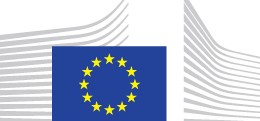
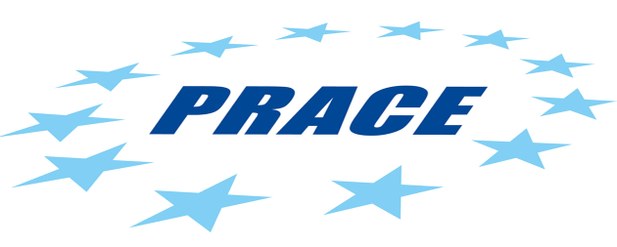
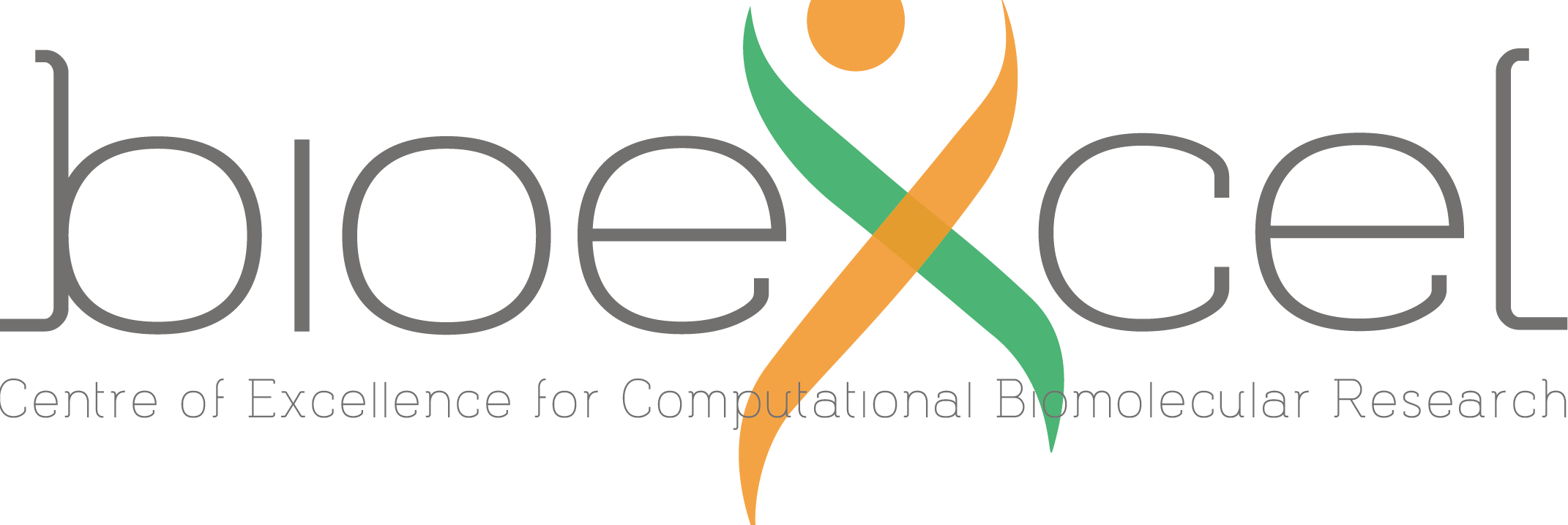
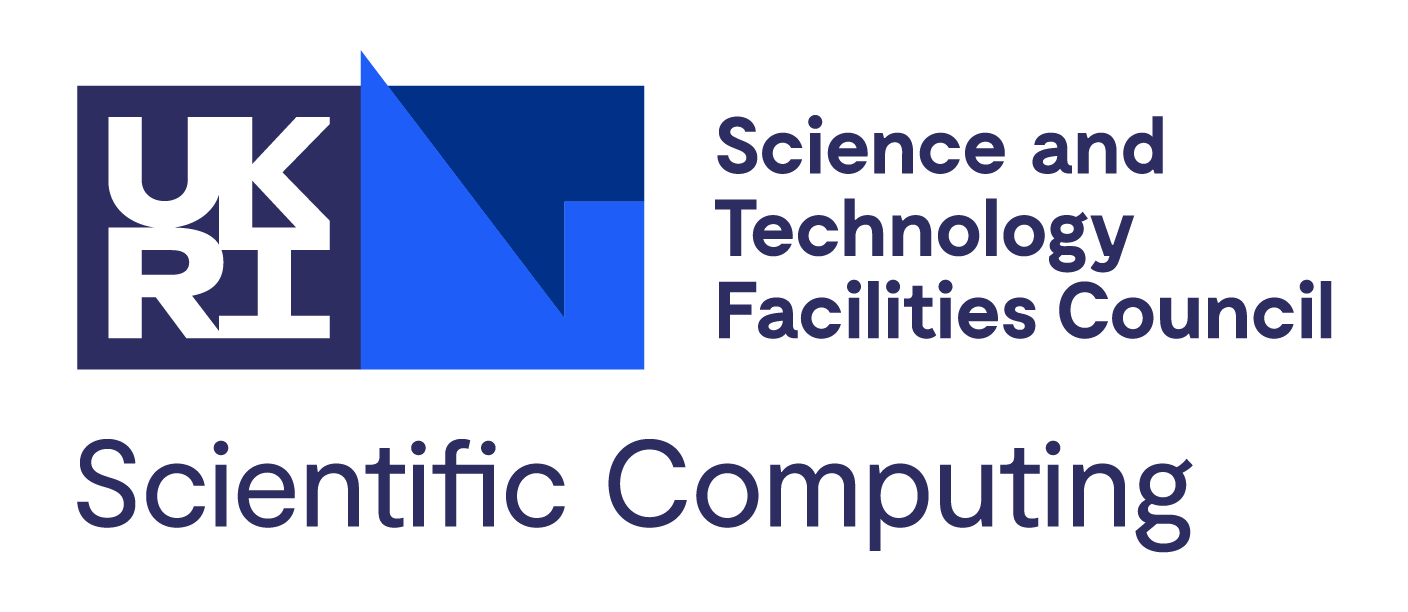
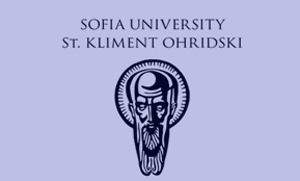
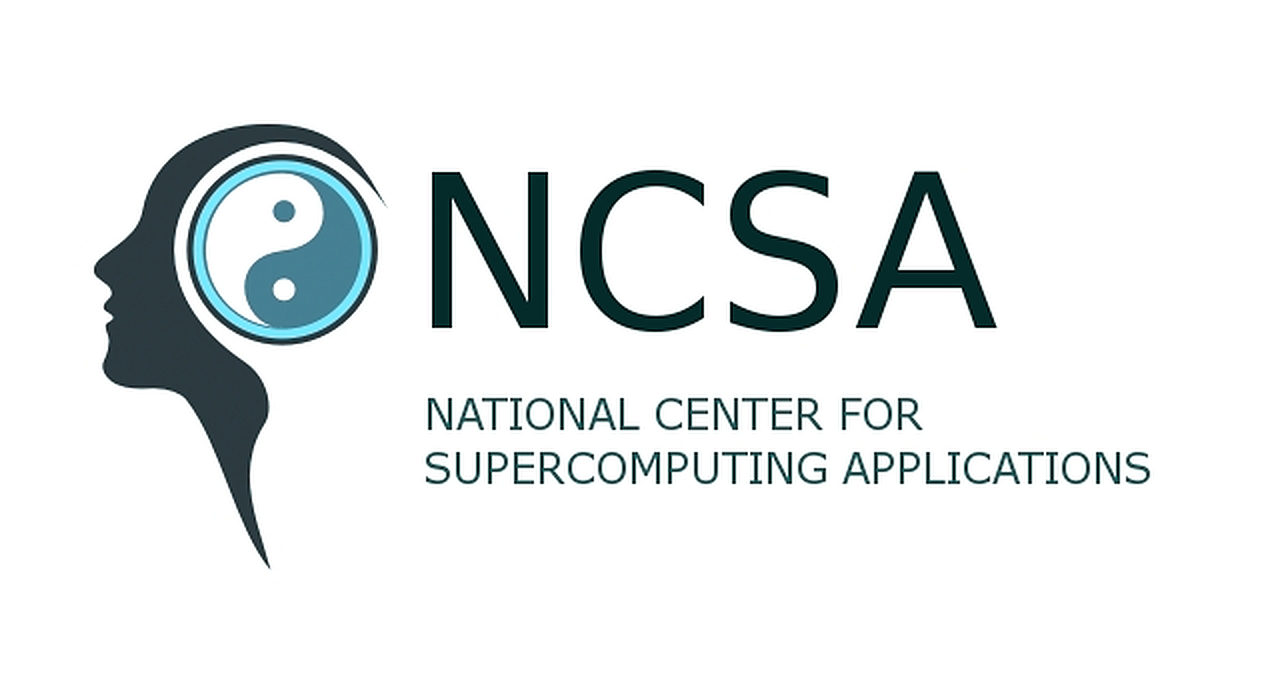
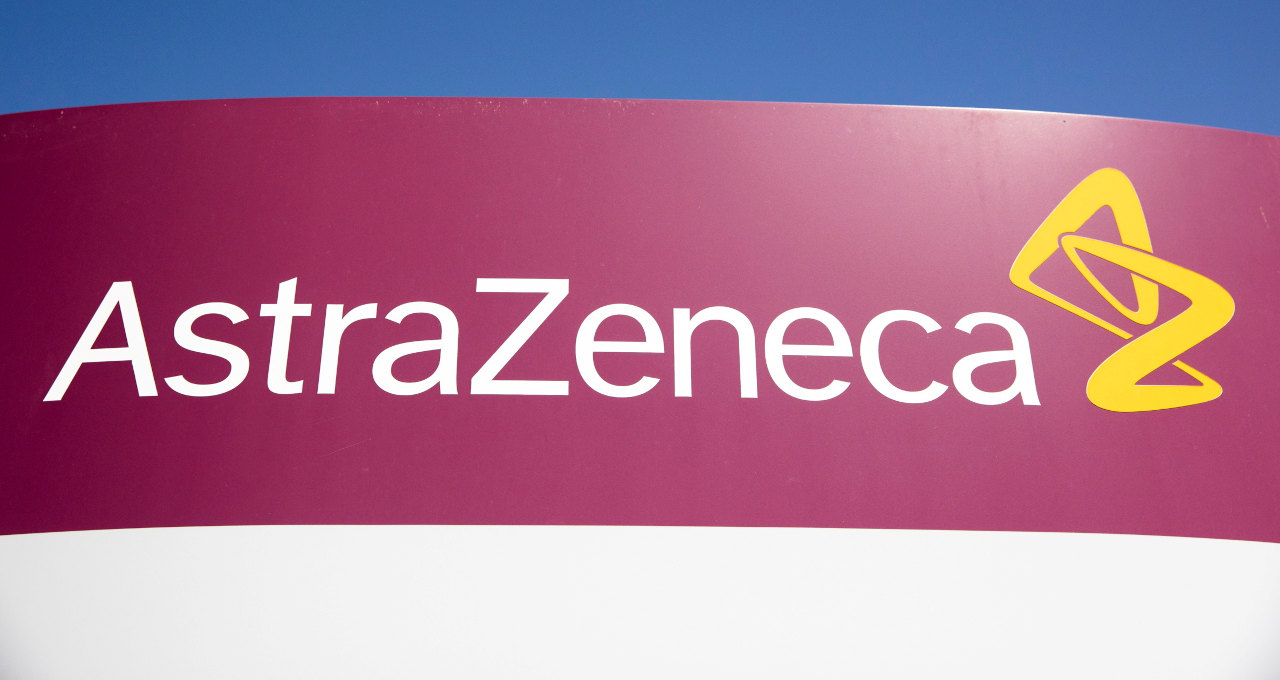
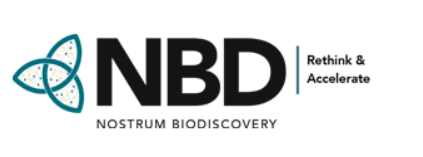
Confrence on High Performance Computing – Bulgaria 2019
June 12, 2019
The Conference will be held in Borovets, Bulgaria, from 2-nd to 6-th of September 2019. HPC 2019 will be open by the Commissioner Mariya Gabriel, Mrs. Karina Angelieva – Deputy Minister of Education and Science, and Acad. Julian Revalski, President of the Bulgarian Academy of Sciences, by the Department of Parallel Algorithms, Institute of Information…
Shaping Europe’s Digital Future
April 19, 2018
Shaping Europe’s Digital Future – Bulgarian Presidency event on High-Performance Computing Sofia, 19 April 2018 “Shaping Europe’s Digital Future – High-Performance Computing for Extreme Scale Scientific and Industrial Applications” is a Bulgarian Presidency event on High-Performance Computing. It will take place on 19 April 2018 at the National Palace of…
Young Researchers Event 2018
April 18, 2018
Young Researchers Event: Brain models and Computation for Brain Medicine Bulgarian Academy of Sciences, Sofia, Bulgaria Sofia, 18 April 2018 This event is open to the entire scientific community but especially targets young researchers. “Young Researchers Event: Brain models and Computation for Brain Medicine” is a Bulgarian Presidency event on Human Brain…
First Europe – China HPC Conference on “Partnership for supercomputing applications”
August 4, 2013
Information about first Europe – China HPC Conference on “Partnership for supercomputing applications”, April 08 – 10, 2013, Grand Hotel Sofia, Sofia Bulgaria The conference was an open forum addressed to a range of scientific and engineering challenges important for further development of the high-performance computing (HPC) in Europe and…